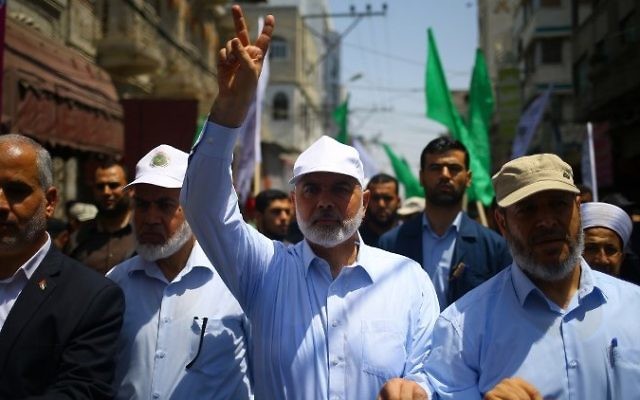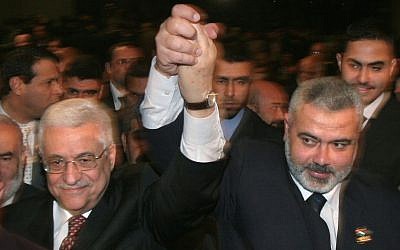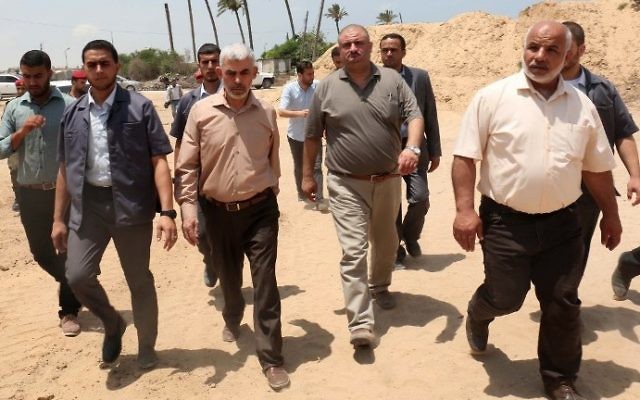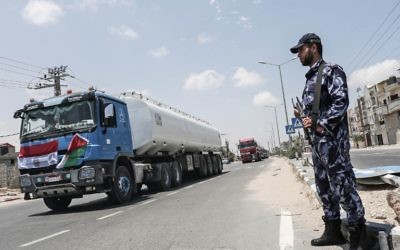Gaza-based terror group says it will agree to Palestinian Authority conditions on forming joint government and holding elections

The Hamas terrorist group on Sunday said it had accepted key conditions demanded by its rival, Palestinian Authority President Mahmoud Abbas, including nationwide elections in the West Bank and Gaza Strip, to clear the way for a reconciliation deal after a 10-year rift that has left the Palestinians divided between two governments.
In a statement issued overnight, Hamas said it was “responding to the generous Egyptian efforts, which reflect the Egyptian desire to end the split and achieve reconciliation, and based on our desire to achieve national unity.”
Hamas said it had dissolved the contentious Administrative Committee that runs Gaza, invited Abbas’ government to return to Gaza and was ready to hold new elections.

The Palestinians have been divided between two rival governments since 2007, when Hamas drove Abbas’ forces out of the Gaza Strip, leaving the president in control only of autonomous areas of the West Bank. Repeated attempts at reconciliation have failed.
Hamas, however, has been greatly weakened by an Israeli and Egyptian blockade, three wars with Israel and international isolation. Gaza’s economy is in tatters and residents of the territory have electricity for only a few hours a day.
The latest announcement comes days after Hamas Egyptian officials met in Cairo for a reconciliation discussions. Abbas sent a delegation of representatives to Egypt as well.
Hamas officials have been in and out of Cairo frequently over recent months in an attempt to improve relations with Egypt, a country with which the Palestinian terror group has had a rocky relationship and is trying to strengthen ties.
Following the meeting, Haniyeh said that Hamas was ready “to hold a dialogue with Fatah in Cairo immediately, to come to an agreement and set the terms for its implementation.”

Despite Sunday’s announcement, however, any reconciliation deal faces many obstacles. The deal was not clear whether Hamas is ready to place its security forces under Abbas’ control — a key sticking point that has scuttled past reconciliation attempts.
There also was no comment from Abbas’ government.
It also was not immediate clear how Egypt’s latest effort aligns with its previous tacit support for a separate Gaza power-sharing deal between Hamas and Mohammed Dahlan, an exiled former Abbas aide-turned-rival.
 Hamas has long been accused by the Egyptian government of aiding the brutal Islamic insurgency in Egypt’s restive North Sinai region, but in recent months, Hamas has beefed up security along Gaza’s southern border with Egypt, seeking to assure Cairo that it is fighting IS sympathizers.
Hamas has long been accused by the Egyptian government of aiding the brutal Islamic insurgency in Egypt’s restive North Sinai region, but in recent months, Hamas has beefed up security along Gaza’s southern border with Egypt, seeking to assure Cairo that it is fighting IS sympathizers.
In exchange, Egypt is supposed to alleviate its blockade of Gaza by opening the Rafah crossing — the only way out of Gaza except through Israel — as well as increase commercial ties with the Strip.
The Rafah crossing is infrequently opened, leaving the strict Israeli border as the only other option for Palestinians who want to enter or exit the Strip.
PA officials have said Egypt assured Ramallah it will not reopen the Rafah crossing until Abbas’s “legitimate authority” is represented on the border.
As reported by The Times of Israel
